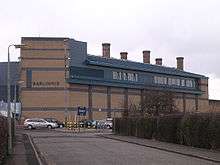HM Prison Barlinnie
 | |
| Location | Riddrie, Glasgow |
|---|---|
| Status | Operational |
| Capacity | 1018 |
| Population | 1600 (approx) |
| Opened | 1882 |
| Managed by | Scottish Prison Service |
| Governor | Jaclyn Clinton (Acting) |
HM Prison Barlinnie is a prison operated by the Scottish Prison Service and located in the residential suburb of Riddrie, in the north east of Glasgow, Scotland.
History
Barlinnie was designed by Major General T.B. Collinson, architect and engineer to the Scottish Prison Department, and it was built in the then rural area of Riddrie adjacent to the Monkland Canal (now the route of the M8 Motorway), first opening with the commissioning of A hall in July 1882. Barlinnie prison consists of 5 accommodation halls: A, B, C, D, and E, that were built in stages between 1882 and 1897, with each holding approximately 200 inmates. There was a major extension to the perimeter in 1967 to create an industrial compound. From 1973 till 1994, the world-famous "Special Unit" placed emphasis on rehabilitation, the best known success story being that of reformed Glasgow gangster Jimmy Boyle.
Capital punishment
A total of 10 judicial executions by hanging took place at HMP Barlinnie between 1947 and 1960, replacing the gallows at Duke Street Prison before the final abolition of Capital punishment in the United Kingdom for murder in 1969:[1]
| Date | Name | Age (years) | Executioner |
|---|---|---|---|
| 8 February 1946 | John Lyon | 21 | Thomas Pierrepoint |
| 6 April 1946 | Patrick Carraher | 39 | Thomas Pierrepoint |
| 10 August 1946 | John Caldwell | 20 | Albert Pierrepoint |
| 30 October 1950 | Christopher Harris | 28 | Albert Pierrepoint |
| 16 December 1950 | James Robertson | 33 | Albert Pierrepoint |
| 12 April 1952 | James Smith | 22 | Albert Pierrepoint |
| 29 May 1952 | Patrick Gallagher Deveney | 42 | Albert Pierrepoint |
| 26 January 1953 | George Francis Shaw | 25 | Albert Pierrepoint |
| 11 July 1958 | Peter Manuel | 31 | Harry Allen |
| 22 December 1960 | Anthony Miller | 19 | Harry Allen |
Each of the condemned men had been convicted of murder. All the executions took place at 8.00 am. As was the custom, the remains of all executed prisoners were the property of the state, and were therefore buried in unmarked graves within the walls of the prison. During the D hall renovations of 1997, the prison gallows cell (built into D-hall) was finally demolished and the remains of all the executed prisoners were exhumed for reburial elsewhere.The first man to escape from Barlinnie was John Dobbie, three days after being sentenced to 15 years for a violent robbery in 1985. Dobbie escaped inside a laundry van, he was captured by armed police 5 days later and was sentenced to a further 5 years.[2]
Current use
Today Barlinnie is the largest prison in Scotland, regularly holding well over 1,000 prisoners, although it has a design capacity of 1,018. The prison currently receives prisoners from the courts in the West of Scotland as well as retaining male remand prisoners and prisoners serving less than 4-year sentences. It also allocates suitable prisoners from its convicted population to lower security prisons, including HMP Low Moss and HMP Greenock as well as holding long-term prisoners in the initial phase of their sentence, prior to transfer to long-term prisons such as HMP Glenochil, HMP Shotts, HMP Kilmarnock or HMP Grampian.
Barlinnie prison still consists of 5 accommodation halls with each holding approximately 200 inmates and an additional National Top End Facility (Letham Hall) housing long term prisoners nearing the end of their incarceration. There is also a hospital unit with accommodation for 18 prisoners, which includes 8 cells specially designed for suicide supervision. A new administration and visiting block was completed in 1999 and all five accommodation halls were refurbished between 1997 and 2004.
The prison is colloquially known as the "Bar-L" in some parts of Scotland. The in-cell bucket-as-toilet routine known as slopping out was still in practice there as late as 2003. Since 2001, refurbishment has taken place after critical reports by the Scottish Chief Inspector of Prisons.[3]
Notable former inmates
- Paul Ferris[4] – Glasgow Gangland figure
- Jimmy Boyle[5]
- Duncan Ferguson[6]
- Abdelbaset al-Megrahi[7] – Lockerbie Bomber
- Duncan Bannatyne[8]
- Tommy Sheridan[9] – Scottish Politician
- Stephen Gough – A naked rambler repeatedly imprisoned for public nudity.
- Scott Harrison – Former world featherweight champion boxer
References
- ↑ Executions in Scotland in the 20th century.
- ↑ Dangerous prisoner in second escape
- ↑ "Slopping out 'must end'". BBC News. 3 October 2013. Retrieved 29 September 2013.
- ↑ The Ferris Conspiracy, pp. 86–91.
- ↑ A Sense of Freedom, pp. 85–89.
- ↑ SFAQs
- ↑ Gunn, David. "Lockerbie bomber Al Megrahi treated for 'advanced cancer'". The Scotsman. Retrieved 5 June 2010.
- ↑ Bannatyne, Duncan (17 March 2007). "Dragons' Den Duncan Bannatyne: How to make £100m". Daily Mail. London.
- ↑ Carrell, Severin (26 January 2011). "Tommy Sheridan sentenced to three years in prison". The Guardian. London. Retrieved 3 August 2012.
External links
- HMP Barlinnie (SPS Website)
- 'Hanging With Frank' (video showing UK execution protocol at the old gallows in Barlinnie Prison)
Coordinates: 55°52′10″N 4°10′55″W / 55.86944°N 4.18194°W
